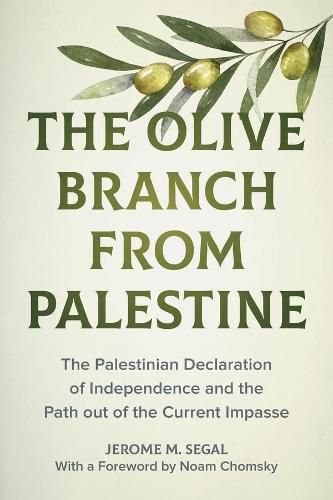Readings Newsletter
Become a Readings Member to make your shopping experience even easier.
Sign in or sign up for free!
You’re not far away from qualifying for FREE standard shipping within Australia
You’ve qualified for FREE standard shipping within Australia
The cart is loading…






Israeli settlements are proliferating in Palestinian territory, and if they are annexed, the possibility of a future Palestinian state is virtually impossible. Could it have been otherwise? Can it still be? These are the questions Jerome M. Segal poses in The Olive Branch from Palestine. Carefully argued and highly informative, this book is centered on an original strategy that Segal devised-a strategy adopted but only partially implemented by Palestinian leadership, leaving its feasibility untested. The first step of this strategy was the issuance in November 1988 of the Palestinian Declaration of Independence. That document, authored by Palestinian national poet Mahmoud Darwish and modeled on Israel’s own Declaration, called for a Palestinian state that would live in peace with Israel.
In The Olive Branch from Palestine, Segal provides in the first part an analytical and historical study of the 1988 Declaration, a remarkable act of unilateral peacemaking through which the PLO accepted the legitimacy of the 1947 Partition Resolution and thereby redefined Palestinian nationalism. In the second part, he proposes a new strategy based on solutions to the two core issues of 1948: the preservation of a Jewish state, and the rights and circumstances of Palestinian refugees. With The Olive Branch from Palestine, Jerome Segal offers a new narrative of the peace process and details a Palestinian-led strategy that could end the conflict.
$9.00 standard shipping within Australia
FREE standard shipping within Australia for orders over $100.00
Express & International shipping calculated at checkout
Israeli settlements are proliferating in Palestinian territory, and if they are annexed, the possibility of a future Palestinian state is virtually impossible. Could it have been otherwise? Can it still be? These are the questions Jerome M. Segal poses in The Olive Branch from Palestine. Carefully argued and highly informative, this book is centered on an original strategy that Segal devised-a strategy adopted but only partially implemented by Palestinian leadership, leaving its feasibility untested. The first step of this strategy was the issuance in November 1988 of the Palestinian Declaration of Independence. That document, authored by Palestinian national poet Mahmoud Darwish and modeled on Israel’s own Declaration, called for a Palestinian state that would live in peace with Israel.
In The Olive Branch from Palestine, Segal provides in the first part an analytical and historical study of the 1988 Declaration, a remarkable act of unilateral peacemaking through which the PLO accepted the legitimacy of the 1947 Partition Resolution and thereby redefined Palestinian nationalism. In the second part, he proposes a new strategy based on solutions to the two core issues of 1948: the preservation of a Jewish state, and the rights and circumstances of Palestinian refugees. With The Olive Branch from Palestine, Jerome Segal offers a new narrative of the peace process and details a Palestinian-led strategy that could end the conflict.